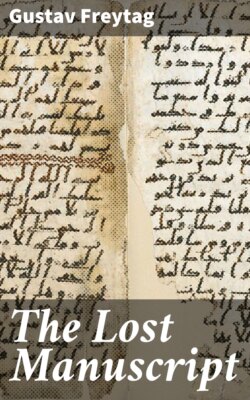Читать книгу The Lost Manuscript - Gustav Freytag - Страница 48
На сайте Литреса книга снята с продажи.
Оглавление"Reason doth folly, good doth evil grow;
The child must reap the mischief that the fathers sow."
Had she not wished to do what was reasonable and kind, and had not folly and evil arisen from it? And had not misfortune befallen her without her fault merely because she was a child of the house? With this sentence she closed a passionate effusion. But in order not to appear to her conscience devoid of affection, the poor child wrote immediately underneath these words: "My dear, good father." Then she closed the book, feeling more comforted.
But the severest humiliation to her was the feeling that she should be judged unjustly by the people over the way; and she folded her arms and thought how she could justify herself. She, indeed, could do nothing; but there was a worthy man who was the confidant of every one in the house, who had cured her canary bird when ill, and removed a stain from the nose of her little bust of Schiller. She resolved, therefore, to tell only the faithful Gabriel what Mrs. Hahn had said, and not a word to her mother unless obliged to do so.
It happened that toward evening Gabriel and Dorchen entered into conversation in the street. Dorchen began to make bitter complaints of the spitefulness of the Hummels, but Gabriel earnestly advised her not to allow herself to be dragged into these disputes. Said he, "there must be some who take a neutral stand. Be an angel, Dorchen, and bring peace and good will into the house; for the daughter is innocent." Whereupon the history of giving the name was spoken of, and Laura honorably acquitted.
Then, when Gabriel, a little later, incidentally remarked to Laura: "This matter is settled; and Mr. Hahn has said that it had at once appeared to him improbable that you should be so ill-disposed toward him,"--a heavy weight fell from her heart, and again her soft song sounded through the house. And yet she did not feel satisfied, for the annoyance to the neighboring house caused by her father's anger still continued. Alas! she could not restrain that violent spirit, but she must endeavor secretly to atone for his injustice. She pondered over this while undressing late at night; but when in bed, after entertaining and rejecting many projects, the right idea suddenly struck her; she jumped up at once, lighted her candle, and ran in her night-dress to the writing-table. There she emptied her purse, and counted over the new dollars that her father had given her at Christmas and on her birthday. These dollars she determined to spend in a secret method of reparation. Highly pleased, she took the precious purse to bed with her, laid it under her pillow, and slept peacefully upon it, although the spectral dogs raged round the house in their wild career, horribly and incessantly.
The following morning Laura wrote in large, stiff characters, on an empty envelope, Mr. Hahn's name and address, and affixed a seal on which was the impression of a violet with the inscription, "I conceal myself," and put it in her pocket. On her way to town to make some purchases she stopped at a hot-house, the proprietor of which was unknown to her. There she bought a bushy plant of dwarf orange, full of flowers and golden fruit--a splendid specimen of the greenhouse; with a beating heart, she drove in a closed cab, till she found a porter, to whom she gave an extraordinary gratuity, and bade him leave the plant and envelope at Mr. Hahn's house without word or greeting of any kind.
The man performed the commission faithfully. Dorchen discovered the plant in the hall, and it caused an agreeable excitement in the Hahn family--fruitless imaginations, repeated inspection, and vain conjectures. When at noon Laura peeped through the arbor into the garden, she had the pleasure of seeing the orange plant occupying a prominent place in front of the white Muse. Beautifully did the white and gold of the shrub glitter across the street. Laura stood long behind the branches, unconsciously folding her hands. Her soul was unburdened of the injustice, and she turned from the hostile house with a feeling of proud satisfaction.
Meanwhile there was a complaint issued and a suit was pending between the two houses, which was seriously increased on that very day by the adoption of the dogs' names "Fighthahn" and "Spitehahn."
Thus the peace in house and neighborhood was still disturbed. At first the pealing of bells had excited public opinion against Mr. Hahn, but this was entirely altered by the introduction of the dogs: the whole street went over to the man of straw; the man of felt had all the world against him. But Mr. Hummel cared little for this. In the evening he sat in the garden on the upturned boat, looking proudly at the neighboring house, while Fighthahn and the other dog sat at his feet blinking at the moon, who in her usual way looked down maliciously on Mr. Hummel, Mr. Hahn, and all the rest of the world.
It happened on the following night that amidst the barking of the dogs and the light of the moon all the bells were torn down from the temple of Mr. Hahn and stolen.
